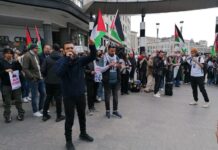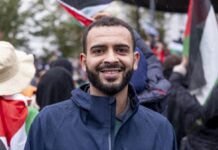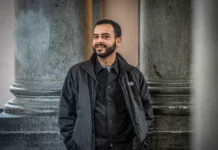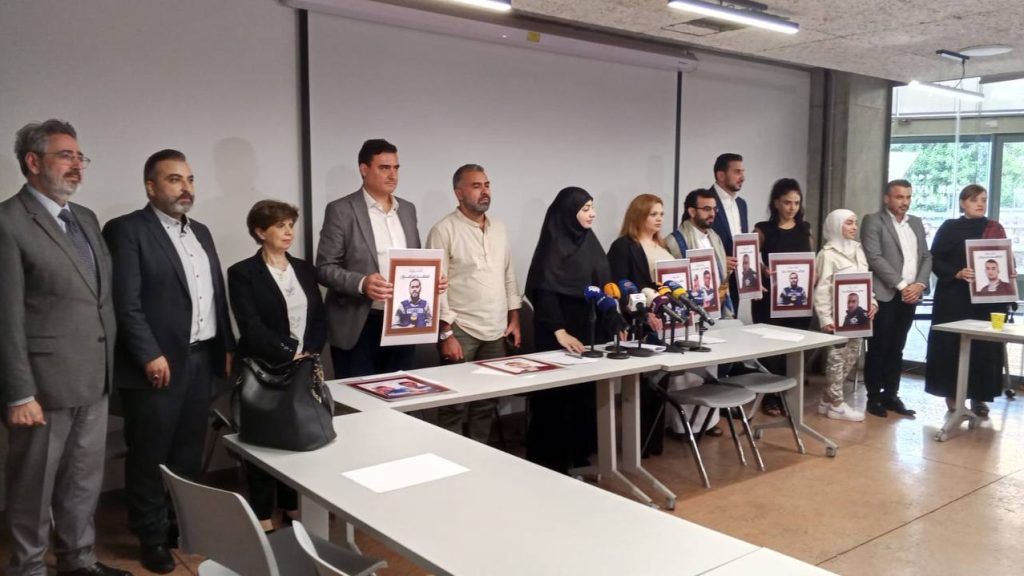
The Journalist Support Committee held an event in solidarity with Palestinian journalists on Thursday, 2 October 2025 in Beirut, Lebanon, with broad participation from Lebanese, Palestinian, Yemeni and other Arab media outlets. Charlotte Kates, international coordinator of Samidoun Palestinian Prisoner Solidarity Network and the deputy secretary-general of the International Association of Democratic Lawyers, participated in the event, speaking about the imprisonment of Palestinian journalists in Zionist jails and international accountability for ongoing genocide in Gaza and throughout occupied Palestine.
The event, marking the International Day of Solidarity with Palestinian Journalists, highlighted the over 300 Palestinian journalists who have been martyred at the hands of the Zionist occupation forces in the past two years, especially in the Gaza Strip, under siege and genocidal assault. It was introduced by Hanan Sharaf el-Din, a member of the Executive Board of the Journalist Support Committee, emphasizing the moral and human duty to stand in solidarity with Palestinian journalists, those recording the path of history.
Maysam Butari of the Journalist Support Committee spoke first, emphasizing that Palestinian journalists do not only spread the news but are witnesses to truth, carrying out resistance through words and images and confronting an unjust war machine; she urged international parties to uphold their responsibilities to hold the occupation accountable for its crimes.
Ahmed Sabbahi of the Palestine Today TV channel emphasized that the Palestinian journalist is a voice of truth confronting injustice, emphasizing the dedication and commitment of Palestinian journalists in Gaza, maintaining their courage, commitment and faith in Palestine despite working in tents under harsh conditions without food and water.
Tawfiq Salim of Al-Aqsa TV said that “The Palestinian journalist is now on the front line of the battle for awareness, in a world where words are terrorized, images are condemned, and truth is threatened,” noting that over decades, there has been no accountability for the ongoing crimes against Palestinian journalists, writers and thinkers.
Speaking on behalf of the Palestinian Journalists Forum, Khaled al-Khalil noted that solidarity, particularly from other media professionals is an important unifying force for Palestinian journalists, supporting their steadfastness and ability to withstand all attempts to destroy their rights of expression and media work.
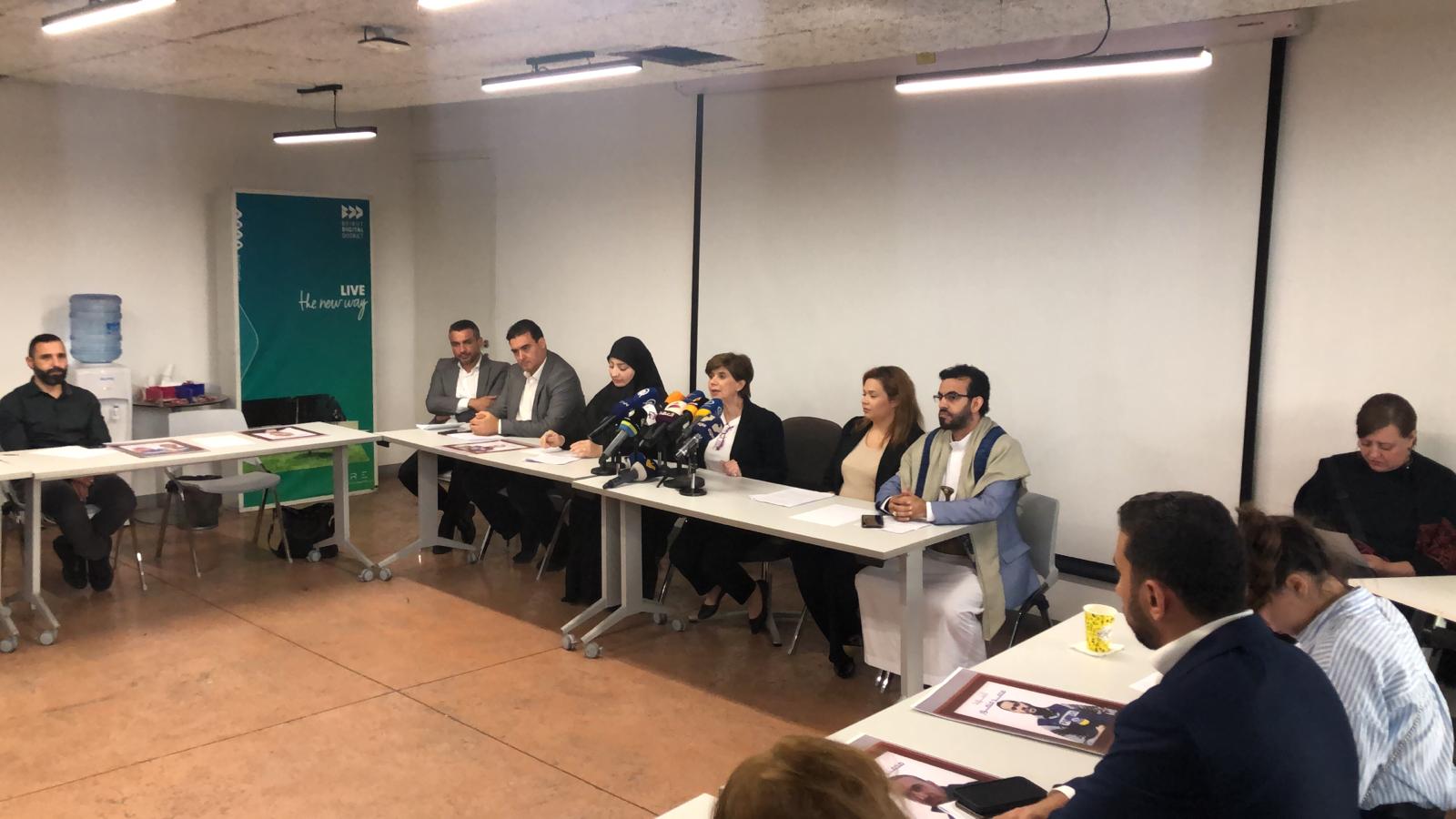
Journalist Hala Haddad spoke on behalf of the Syndicate of Audiovisual Media Workers in Lebanon, emphasizing that real journalists, who are flesh and blood — especially in Palestine — are the foundation of truth, while media outlets ignore their realities and instead compete on the use of artificial intelligence.
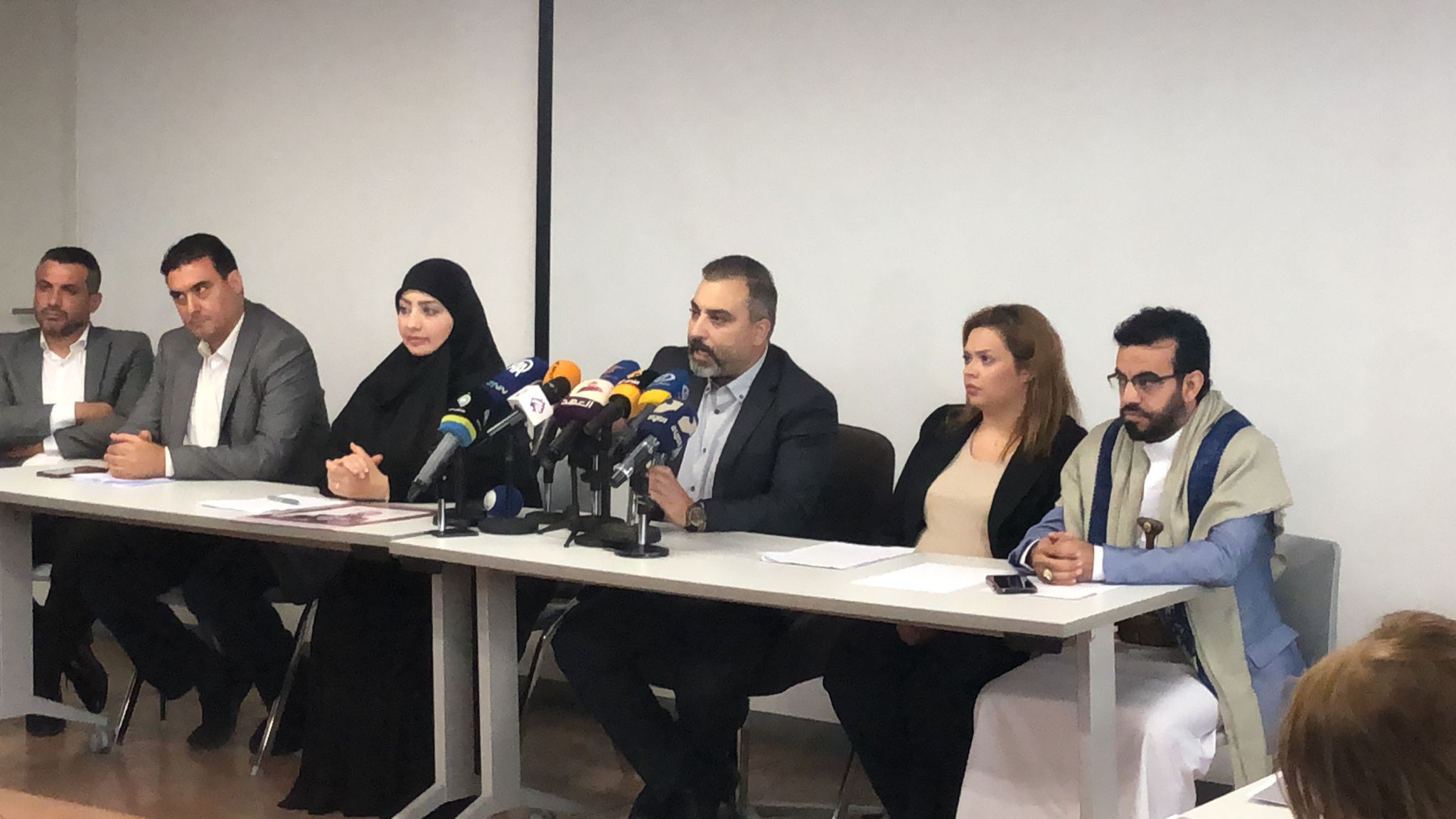
Mohammed Kazan of the Lebanese Media Group noted that all journalists are part of this battle, emphasizing that the genocide and the resistance to it are not only a military matter but instead include a psychological, media and propaganda war, in which the honesty of Palestinian journalists confronts the technological deceptions of the enemy.
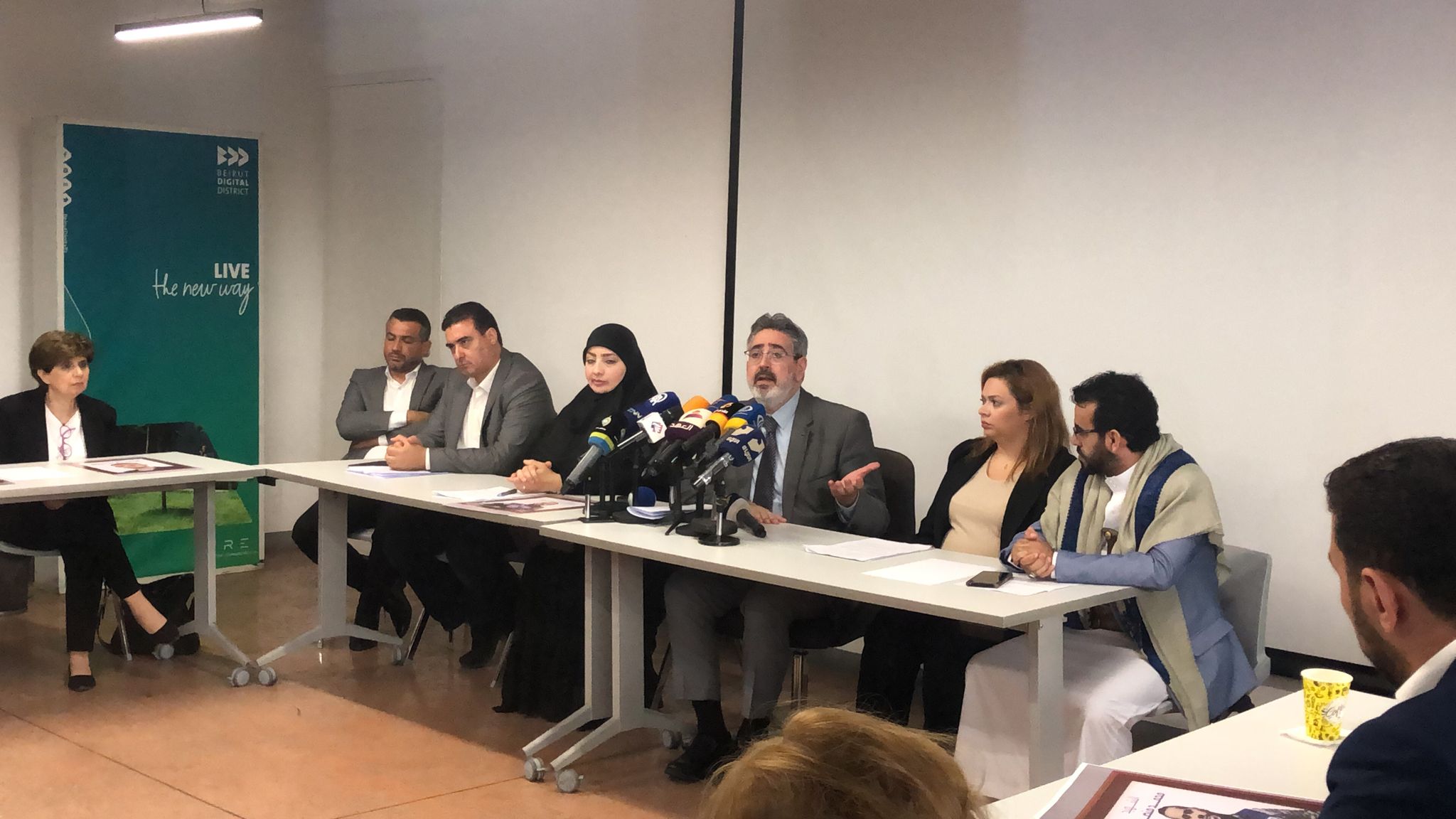
Director of Al-Mayadeen office, Roni Alpha, noted that each journalist in the meeting had lost colleagues and friends practicing their profession and that their participation is an act of solidarity with their colleagues martyred as a result of the Zionist genocide. He emphasized that a responsible stance that preserves facts and credibility requires solidarity with Palestinian journalists under fire.
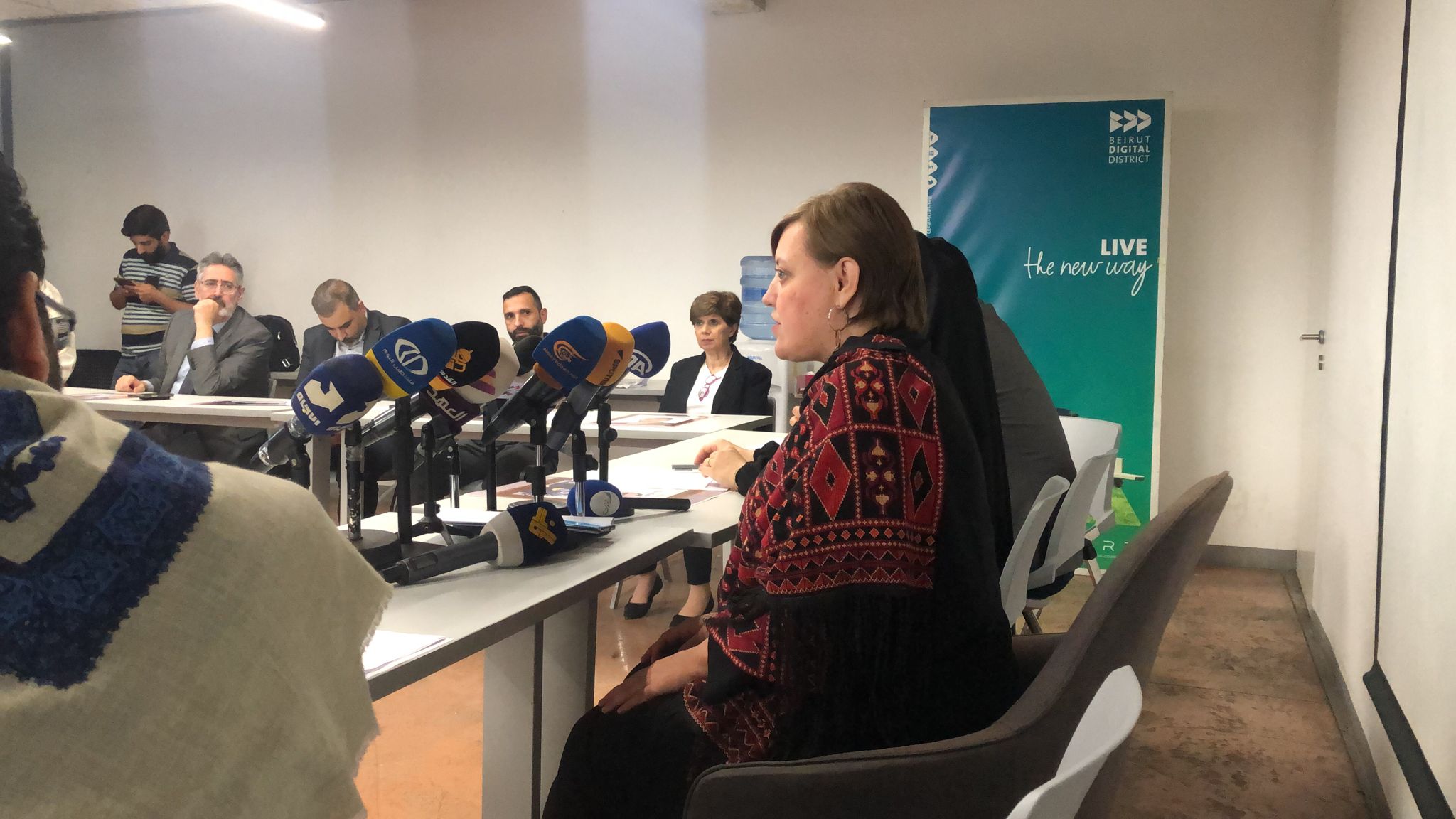 Charlotte Kates noted that the Zionist-imperialist assault on Palestine, particularly on Gaza, includes a systematic policy of targeting journalists and media workers as a method and mechanism of carrying out genocide. She further noted that over 50 journalists are imprisoned inside Zionist jails, many held under administrative detention without charge or trial. Criticizing Western state-sponsored and corporate media, she noted that those responsible for inciting and promoting genocide should be held accountable internationally.
Charlotte Kates noted that the Zionist-imperialist assault on Palestine, particularly on Gaza, includes a systematic policy of targeting journalists and media workers as a method and mechanism of carrying out genocide. She further noted that over 50 journalists are imprisoned inside Zionist jails, many held under administrative detention without charge or trial. Criticizing Western state-sponsored and corporate media, she noted that those responsible for inciting and promoting genocide should be held accountable internationally.
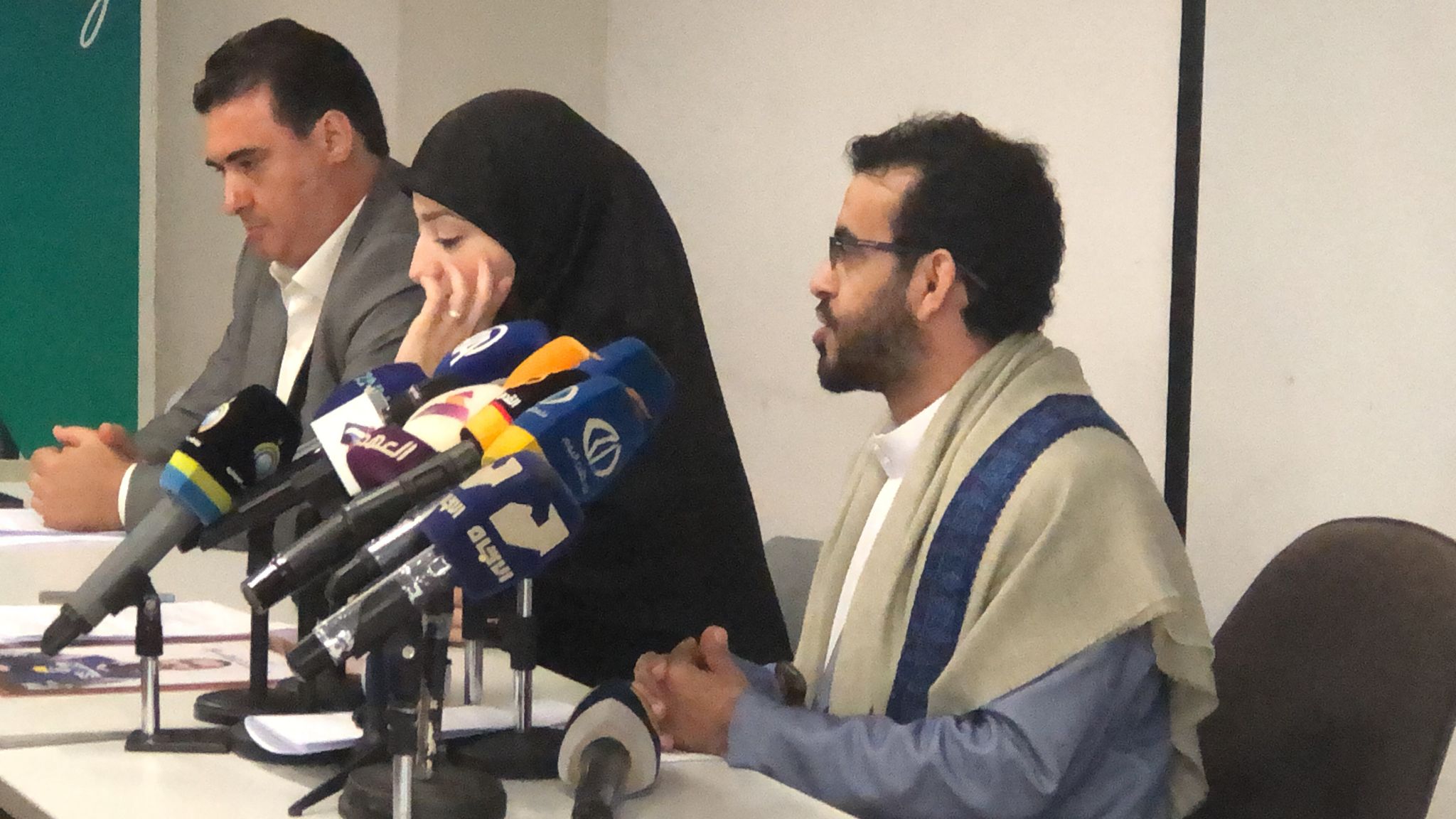
Ali al-Zuhri, speaking on behalf of the Yemeni media, emphasized that Palestinian journalists are confronting not only killing and massacre at the hands of the occupation, but also a siege of disinformation, including on social media platforms that routinely silence Palestinian accounts. He emphasized that the Yemeni media stands by Palestine, noting “We are with you in every action, word and deed.”
Below are the full remarks by Charlotte Kates:
As we gather today, to stand in solidarity with the Palestinian journalists under siege, targeted for assassination, imprisoned under torture, by the Zionist regime, “Israel,” for their reporting and their truth, I want to note that we are also one day before the first anniversary of the assassination of the great and courageous leader, Sayyed Hashem Safieddine, on 3 October 2024; and one week following the assassination of the great Arab, Lebanese and international figure of resistance, Sayyed Hassan Nasrallah, by hundreds of tons of U.S. made bombs dropped by Zionist warplanes. Their path of resistance, clarity and truth, continues on today, never stopped or erased by the horrific crimes of the occupier and the colonizer.
Of course, we also must note that amid the ongoing, extraordinarily violent attempts of the Zionist project to shield its genocide from global exposure and international isolation through the targeting of journalists, writers, camerapeople and photographers, the Global Sumud Flotilla – many of whose participants were themselves inspired by the work of Palestinian journalists – was today targeted by the Zionists, attacking over 40 boats in international waters with 500 participants, sailing to break the siege, end the genocide, to deliver aid, but not only to deliver aid but to take action to break the siege when third states are instead complicit in the ongoing genocidal assault on Gaza.
The assassination of journalists, writers and thinkers as a policy of the Zionist occupation is not one that began two years ago, with the inception of the escalated genocide against the Palestinian people, and particularly targeting Gaza, following the rise of the resistance and Al-Aqsa Flood, but also has been a component of the 77 years of genocide in occupied Palestine. Here in Lebanon, Palestinian writers like Ghassan Kanafani and Kamal Nasser – engaged writers who were leaders in the cultural resistance to colonialism and the propagation of the Palestinian narrative – were assassinated by Zionist forces over 50 years ago, in a clear precedent to the ongoing assassinations and en masse targeting of journalists in Palestine, especially in the Gaza Strip; Lebanon; and Yemen.
The targeting of journalists is a systematic attack on truth-telling, documentation and reality itself, particularly after well over 700 days of what has been called “the world’s first live-streamed genocide.” Palestinian journalists have played a necessary and essential role in exposing the crimes of Zionism and imperialism before the world, in conveying the horrific daily reality of genocide in Gaza internationally, and they have been brutally targeted. At the same time that the occupation refuses to allow the entry of independent international journalists, it repeatedly targets Palestinian journalists, as if the global outrage and revulsion against the Zionist project and its genocide can be stemmed by eradicating those who expose its reality.
The law is clear: journalists are protected persons. However, In the past two years, the Zionist entity has killed over 304 journalists in Palestine, mostly in Gaza Strip alone. To this is added the massacre of 36 journalists in Yemen, ten in Lebanon, three in Iran. This is the deadliest armed conflict for journalists on record in modern history, with the targeting of journalists made an explicit tool of genocide.
It is not only assassination that the occupation pursues against journalists but also imprisonment. There are at least 50 journalists in occupation prisons, amid 11,000 Palestinian prisoners in Zionist jails, subjected to routine and systematic torture, starvation, abuse, physical, psychological and sexual assault, and even assassination behind bars. Most of these journalists are imprisoned with no charge and no trial under administrative detention orders, indefinitely renewable.
Journalists play a critical role in documenting the crimes being carried out today in occupied Palestine, laying out the record of genocide for prosecutions to come. However, they also play a critical role in documenting those who make history, the people and their resistance, so that their suffering, their steadfastness, their heroism and their strikes against the enemy are also portrayed before the nation and the world.
It is clear that “Israel” is carrying out a genocide in Palestine, especially in Gaza, and that the targeting of journalists is a method of genocide. However, what also must be clear is the international responsibility. The same Western imperialist powers led by the US that provide the weapons and the intelligence cooperation to enable the assassination of journalists are fully complicit in this targeting as is Western mainstream corporate and state media. Even the employers of targeted journalists like Reuters and the AP issue vague statements without naming the party responsible for the killings and publish zionist propaganda. The New York Times won a Pulitzer prize for publishing a discredited zionist article by a former occupation soldier. Big tech companies close Palestinian journalists’ accounts while zionist state ministries pay Western influencers $7000 per post to whitewash genocide. We must be clear – the official sources of disinformation and genocide denial can and must be held accountable, not only at a popular and sentimental level but legally as well, as an international responsibility.
It is the responsibility of journalists, particularly international journalists, to be engaged journalists and not stenographers for the Zionist regime, to report the stories of the martyrs and publicize the journalists who continue to document amid the crimes. And to document and expose the involvement of governments , states and occupation soldiers, to not merely comment on genocide, but to actively work to emulate the example of the martyred journalists, to be truth tellers of the people, of the resistance and of humanity.
For a free Palestine, from the river to the sea: the implementation of necessity, truth and conscience.
October 2, 2025
Charlotte Kates
Deputy Secretary-General, International Association of Democratic Lawyers
International Coordinator, Samidoun Palestinian Prisoner Solidarity Network
Discover more from Samidoun: Palestinian Prisoner Solidarity Network
Subscribe to get the latest posts sent to your email.

